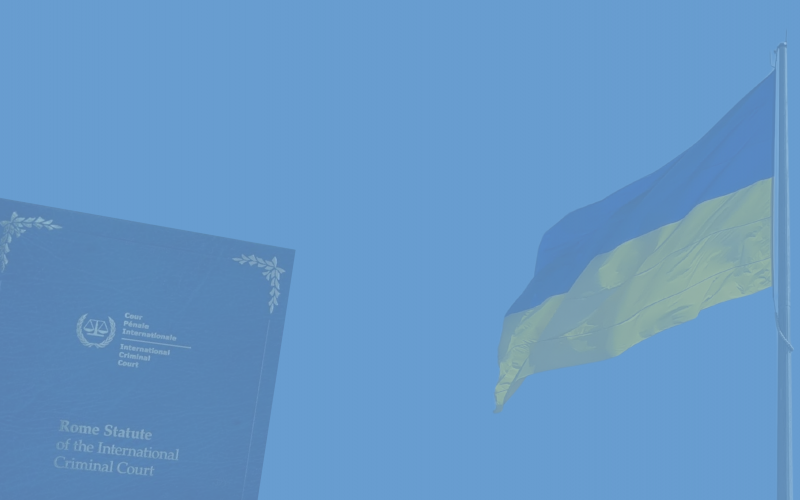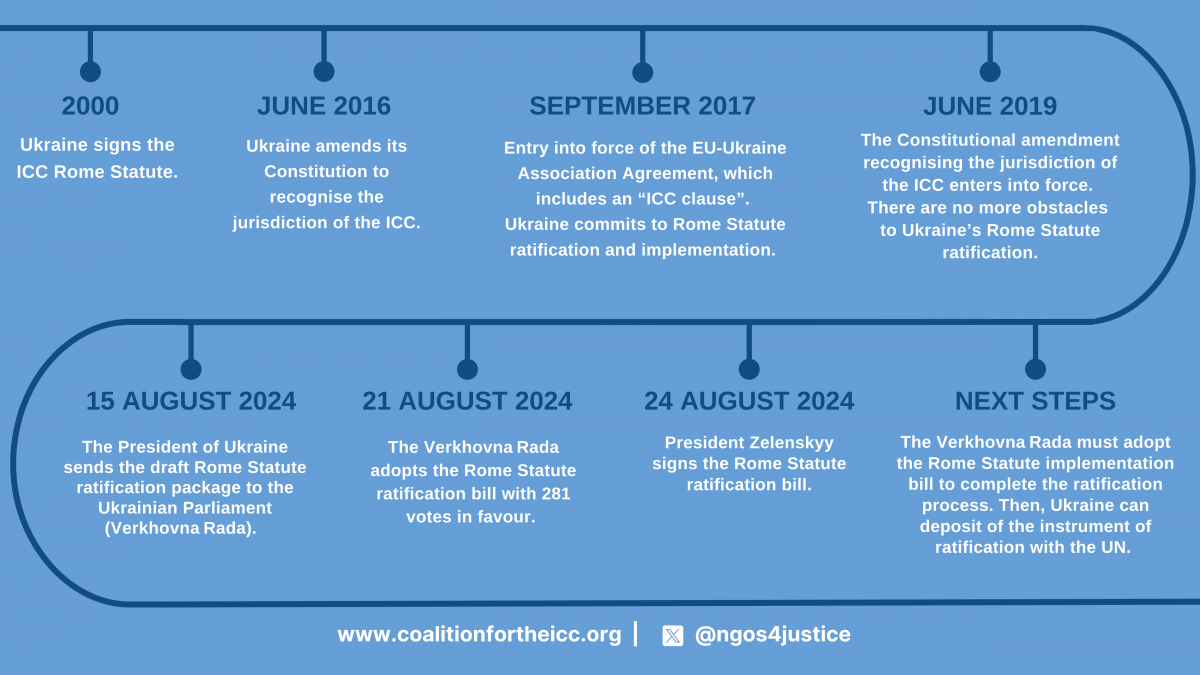Ukraine moves towards ratification of the ICC Rome Statute

On 24 August 2024, which commemorates Ukraine Independence Day, the President of Ukraine, Volodymyr Zelenskyy, signed the Rome Statute ratification bill into law paving the way for Ukraine to join the International Criminal Court. This follows the 21 August adoption by the Ukrainian parliament (the Verkhovna Rada), with 281 votes in favour, of the “Law on the Ratification of the Rome Statute of the International Criminal Court and its amendments”.
“Ukraine’s long-awaited move toward ratification of the ICC Rome Statute sends a strong message to the international community and to the people of Ukraine that it is committed to bringing perpetrators of international crimes to justice, and that the suffering of victims will not be ignored.” stated Virginie Amato, CICC Advocacy Director.
In line with the ratification law, the Verkhovna Rada will still need to complete the domestic ratification process by adopting a “Draft Law on Amendments to the Criminal and Criminal Procedural Codes of Ukraine in connection with the ratification of the Rome Statute of the International Criminal Court and its amendments.” The draft law will incorporate some of the Rome Statute’s provisions into national law. Only after signing this bill into law can the instrument of ratification of the Rome Statute be deposited with the United Nations (UN). The Rome Statute will enter into force for Ukraine on the 1st day of the month after 60 days following the deposit with the UN (Article 126 of the ICC Statute).
In addition to enabling full ICC membership, the passing of legislation harmonising Ukrainian domestic laws with the Rome Statute’s definitions and principles will better position Ukraine to carry out its primary responsibilities to bring justice for Rome Statute crimes through credible national investigations and prosecutions. The ICC does not replace domestic courts, and is a court of “last resort” with the ‘principle of complementarity’ at the centre of its Statute.
Civil society calls on Ukraine to complete the domestic ratification process swiftly so that it can participate as an ICC member state during the 23rd session of the ICC Assembly of States Parties (ICC-ASP), taking place from 2-7 December in the Hague, the Netherlands. The Assembly of States Parties (ASP) is the ICC’s management oversight and legislative body. It provides the ICC with administrative oversight and takes decisions on issues of importance for the success of the Court, such as election of officials, its annual budget, matters of cooperation and non-cooperation, complementarity and amendments to the Rome Statute and other rules. As an ICC State Party, Ukraine can contribute actively towards the discussions and outcomes of the work of the ASP.
Ukraine has already recognised the role that the ICC can play in addressing impunity by accepting the jurisdiction of the Court over alleged crimes committed on its territory from November 2013 onward, using article 12(3) of the Rome Statute. On the basis of these declarations, between April 2014 and December 2020, the situation in Ukraine was under preliminary examination by the Office of the Prosecutor. In 2022, the ICC prosecutor opened an investigation into the situation in Ukraine and to date, the court’s judges have issued arrest warrants against six individuals including against Mr. Vladimir Putin, President of the Russian Federation.
While welcoming Ukraine’s move towards ICC membership, the Coalition urges the Ukrainian leadership to ratify the ICC treaty without making a declaration under article 124. The newly signed Ukrainian Rome Statute ratification law now indicates that Ukraine intends to make a declaration based on article 124 of the Rome Statute that for seven years after Ukraine’s ratification comes into effect, Ukraine “does not recognize the jurisdiction of the International Criminal Court in relation to crimes under article 8 of the Rome Statute, war crimes, when, likely, the crime was committed by its citizens”. It is the first time that a State has attempted to use Article 124 in this manner. According to article 124, a state, on becoming a state party to the Rome Statute, may declare that for a period of seven years after ratification, it does not accept the Court’s jurisdiction with regard to war crimes allegedly committed by that state’s nationals or on its territory. Such a declaration may be withdrawn at any time. Article 124 of the Rome Statute was included in the Statute in 1998 as a transitional provision, and has not been used since the adoption of the Rome Statute, before the ICC-ASP decided, in 2015, by consensus to amend the Rome Statute in order to delete Article 124 and urged future States Parties not to make use of article 124.
The Coalition for the ICC has opposed the inclusion of article 124 in the Rome Statute and its use by States Parties due to its selective approach to victims’ access to justice and risks to increase the impunity gap for war crimes, thus derailing from the spirit of the Rome Statute.
“Ukraine’s move toward ratification represents a crucial signal at a time the Court has come under further threats and sanctions by several actors including States not party to its Statute. We call on Ukraine to ratify the Rome Statute without any reservation that would undermine victims’ impartial access to justice for all,” continued Virginie Amato.
BACKGROUND
Ukraine’s ratification of the ICC Rome Statute

On 20 January 2000: Ukraine signed the ICC Rome Statute. The ratification process was suspended in 2004 when the Constitutional Court considered the treaty incompatible with the Constitution.
On 29 January 2007: Ukraine is the only State not party to the ICC Rome Statute that accedes to the Agreement on Privileges and Immunities of the Court (APIC).
On 2 June 2016: Ukraine amended its Constitution (amendment to article 124 recognising the jurisdiction of the ICC) paving the way for the country, as of 30 June 2019, to join the Rome Statute.
On 1 September 2017: the EU-Ukraine Association Agreement entered into force. As per Article 8, Ukraine committed to secure Rome Statute ratification and implementation.
On 30 June 2019: the Constitutional amendment to article 124 recognising the jurisdiction of the ICC entered into force. This removed the final obstacle to Ukraine’s ratification of the Rome Statute.
On 15 August 2024, the Office of the President of Ukraine submitted a package of laws for the ratification of the Rome Statute and its amendments to the Ukrainian Parliament (Verkhovna Rada).
On 21 August, the Verkhovna Rada voted in favour of the ratification of the Rome Statute and its amendments, by adopting the “Law on the Ratification of the Rome Statute of the International Criminal Court and its amendments” with 281 votes in favour. As per this Law, the Verkhovna Rada also ratified all amendments to the Rome Statute on war crimes (article 8) and the crime of aggression (article 8 bis).
ICC Investigation into the situation in Ukraine
The ICC Office of the Prosecutor conducted a preliminary examination of the situation in Ukraine between April 2014 and December 2020, focusing on alleged crimes committed on the territory of Ukraine from 21 November 2013 onwards. On 17 April 2014, the government of Ukraine lodged a declaration under article 12(3) of the Rome Statute accepting the ICC's jurisdiction over alleged crimes committed on its territory from 21 November 2013 to 22 February 2014, leading to the opening of the preliminary examination. On 8 September 2015, the government of Ukraine lodged a second declaration under article 12(3) of the Statute accepting the ICC's jurisdiction in relation to alleged crimes committed on its territory from 20 February 2014 onwards, with no end date. On 29 September 2015, the Prosecutor announced the extension of the temporal scope of the existing preliminary examination to include alleged crimes committed after 20 February 2014.
In December 2020, former ICC Prosecutor Fatou Bensouda announced the conclusion of the preliminary examination and that the statutory criteria for opening investigations into the situation in Ukraine were met.
On 28 February 2022, Khan announced his intention to open an investigation into the situation in Ukraine, affirming that “there is a reasonable basis to believe that both alleged war crimes and crimes against humanity have been committed in Ukraine.” The Prosecutor indicated that this conclusion concerns the events assessed by the Office of the Prosecutor since 2013 during the preliminary examination, and any new alleged crimes falling within the jurisdiction of the Court committed by any party on the territory of Ukraine in the context of the recently expanded conflict.
On 2 March 2022, the Office of the Prosecutor of the ICC opened an investigation into the situation in Ukraine, following referrals of the situation by 43 ICC states parties to his Office, thus allowing Prosecutor Khan to initiate the investigation without the need to seek authorisation by the ICC judges.
Between March 2023 and June 2024, ICC judges have issued 6 public arrest warrants in the context of the situation in Ukraine including against Mr. Vladimir Putin, President of the Russian Federation. All six suspects are nationals of the Russian Federation.
On 23 March 2023: The ICC established an ICC country office in Ukraine.
Article 124 of the Rome Statute
According to article 124, a state, on becoming a state party to the Rome Statute, may declare that for a period of seven years after ratification, it does not accept the Court’s jurisdiction with regard to war crimes allegedly committed by that state’s nationals or on its territory. Such a declaration may be withdrawn at any time. Article 124 of the Rome Statute was included in the Statute in 1998 as a transitional provision, and not been used since the adoption of the Rome Statute. Only two States have made use of Article 124, France and Colombia. In 2008, France withdrew its declaration leaving Colombia as the only state party with a declaration under article 124. On several occasions Colombian authorities publicly stated their intentions to withdraw Colombia’s declaration under article 124; and although no effective withdrawal was undertaken, the effects of such a declaration by Colombia expired on 1 November 2009. No ICC State Party currently falls within the Article 124 provision.
At the Rome Conference in 1998, article 124 was designed as a transitional provision in order to facilitate ratification. In December 2015, on a historic move anticipated and long-called for by civil society, all ICC States Parties agreed to delete article 124 from the Rome Statute. The Assembly urged future States Parties not to make use of article 124 and to ratify this amendment leading to deletion of this ‘war crimes opt-out clause’. This amendment to the Rome Statute has not entered into force yet.
At the Rome Conference, civil society was strongly opposed to the inclusion of Article 124 into the Rome Statute for it weakened the jurisdictional regime of the ICC and was seen as incompatible with the object and purpose of the Rome Statute: “to put an end to impunity for the perpetrators of [the most serious] crimes [of concern to the international community as a whole] and thus to contribute to the prevention of such crimes.” Since its inclusion in the Rome Statute as a transitional provision, the Coalition for the ICC has advocated that the ASP removes the transitional provision and for States not to make use of Article 124.
See also:
- Coalition for the ICC. Civil society calls on Ukraine to join the ICC now (15 October 2019)
- Coalition for the ICC. Civil society organisations call on Ukraine to Fully Align its Domestic Legislation with International Criminal Law and International Humanitarian Law (16 September 2020)
- Coalition for the ICC. Civil society urges Ukraine President to sign international crimes law (6 October 2021)
- Coalition for the ICC. With State Party referrals, ICC Prosecutor opens an investigation into the Ukraine situation (8 March 2022)
- Coalition for the ICC. ICC judges issue two arrest warrants in the context of the situation in Ukraine (5 April 2023)
